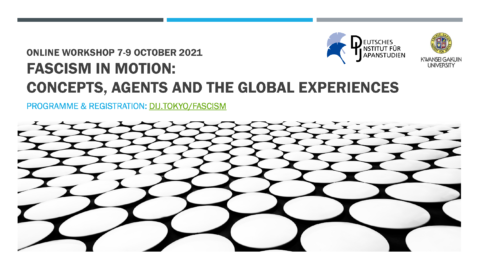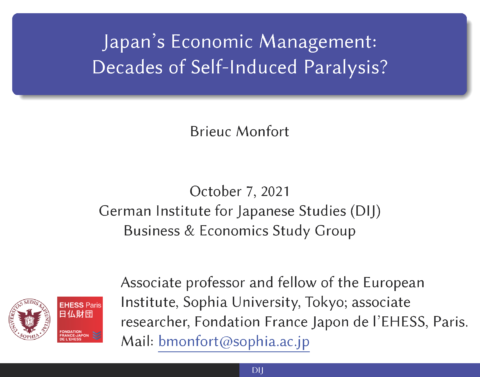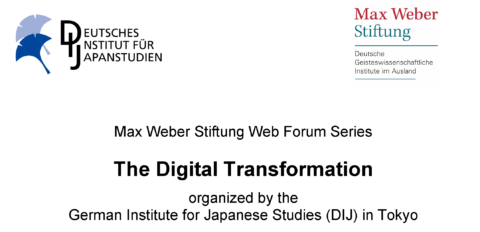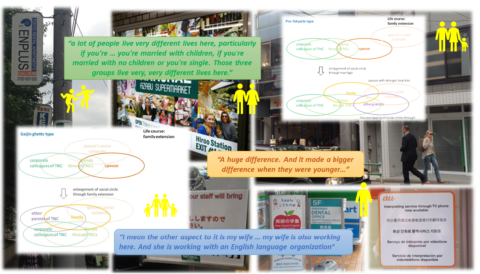イベント&アクティビティ
DIJ researchers discuss Olympic legacy at online workshop

The Tokyo Olympics 2020 are history but two months after the closing ceremony it is far from clear what remains as their legacy: have they spread the virus or the Olympic message? Have they uplifted Japan and further aggravated Japan’s identity crisis? DIJ deputy director Barbara Holthus (“Tainted Love: Volunteering for the Pandemic Olympics”) and principal researcher Sonja Ganseforth (“From ‘No Olympics 2020’ to ‘NOlympics Anywhere’: Reflecting on the Anti-Olympic Movements in Japan before and after Tokyo 2020/1”) will share their insights into how Tokyo 2020 has transformed Japanese society at the online workshop Post-Olympics Japan: Renewal or Failure? Barbara will also be a panelist in the workshop’s closing panel discussion on “What Remains?”. Both are contributors to the DIJ’s special project on the Tokyo Olympics and the open access book publication Japan Through the Lens of the Tokyo Olympics. The workshop is organized by the German Institute for Global and Area Studies, the University of Zurich, and the German Association for Social Science Research on Japan. Details and registration here
Workshop on concepts, agents, and global experiences of Fascism

Beyond the cases of Italy and Nazi Germany, a variety of patterns of fascism and authoritarianism took shape as responses to the unprecedented economic slump and social unrest during the interwar period. However, mainstream studies of fascism still have their focus on European cases. By shedding light on regions that remain underrepresented in studies of fascism, this three-day online workshop aims to trace the border-transcending circulation of ideas and concepts derived from fascism and to grasp its transnational character. With the case studies zooming in on regions such as China, Japan, India, Cambodia, Thailand, Brazil, and Romania, this workshop showcases the large-scale border-crossing movement of concepts and explores the multi-layered intellectual inspirations of agents from various backgrounds. The workshop is organized by the DIJ in cooperation with the School of Humanities, Kwansei Gakuin University. Details and registration here
DIJ Study Group talk discusses Japan’s economic management
 Back in the 1970s, Japanese policymakers earned the reputation of being the most competent within advanced economies for successfully weathering the second oil shock. Where has this reputation gone? The high growth of the late 1980s proved to be transient as a succession of financial crises led to the “lost decade” of the 1990s. Ben Bernanke (1999) famously described the initial measures to fight deflation that would dominate the 2000s as “a self-induced paralysis”. A more forceful set of policies called “Abenomics” in the 2010s ultimately failed to achieve its ambitious goals of 2% GDP growth and 2% inflation, a shortcoming blamed on either error in design or pusillanimity in implementation. This presentation focuses on three cases (the lost decade, Abenomics, Covid-19) to discuss to what extent the narrative of a never-ending crisis reflects hindsight bias, theoretical assumptions, and narrowly defined comparisons. Details and registration here
Back in the 1970s, Japanese policymakers earned the reputation of being the most competent within advanced economies for successfully weathering the second oil shock. Where has this reputation gone? The high growth of the late 1980s proved to be transient as a succession of financial crises led to the “lost decade” of the 1990s. Ben Bernanke (1999) famously described the initial measures to fight deflation that would dominate the 2000s as “a self-induced paralysis”. A more forceful set of policies called “Abenomics” in the 2010s ultimately failed to achieve its ambitious goals of 2% GDP growth and 2% inflation, a shortcoming blamed on either error in design or pusillanimity in implementation. This presentation focuses on three cases (the lost decade, Abenomics, Covid-19) to discuss to what extent the narrative of a never-ending crisis reflects hindsight bias, theoretical assumptions, and narrowly defined comparisons. Details and registration here
Speaker:
Brieuc Monfort, Sophia University
Web Forum Series ‘DT’ session on Governance in the Digital Age

Kaori Hayashi (University of Tokyo), Melike Şahinol (OI Istanbul), and DIJ director Franz Waldenberger will be the speakers in the second session of our MWS Web Forum Series ‘The Digital Transformation’ on September 30. Their presentations will address the theme Governance in the Digital Age from different perspectives. Kaori Hayashi’s paper “Toward a Gender-Equal Society in the AI Era: A Distant Goal for Japan?” will introduce a new initiative that strives to create a more gender-equal media and information culture. In her presentation “Digital Cultures of Health”, Melike Şahinol will question how digital transformation in healthcare has led to empowerment (and for whom) and what new challenges have arisen as a result. Franz Waldenberger’s paper “Regulation in the context of dispersed and contested knowledge” will discuss how regulation strategies to cope with dispersed and contested knowledge are influenced by the new challenges and opportunities caused by the digital transformation. Details and registration here
DIJ lecture on Kawabata Yasunari and his writing of adolescents

Kawabata Yasunari’s (1899–1972) literary works have often been discussed in relation to the objectification of the (female) body as well as his orphan background. Having witnessed a number of deaths in his early life, Kawabata’s acute attention to the loved object seems inseparable from his fundamental awareness of its unreachability. In this talk, Fusako Innami will examine how writing as a medium functions as a mode of connection through special attention to Kawabata’s writing of adolescents. Often attracted to the untouched, not yet touched, or unreachable, his writing creates and re-creates the loved object while extending the self with an extent of reciprocity. This session of the DIJ History and Humanities Study Group is part of the DIJ Gender and Sexuality in East Asia Lecture Series. Details and registration here
Speaker:
Fusako Innami, Durham University
New Web Forum Series explores ‘Digital Transformation’
 The new MWS Web Forum Series ‘The Digital Transformation’ (DT) will kick off on September 23 with three lectures on Knowledge Production in a Data Driven Society. The speakers Yoshiaki Fukami (Gakushuin University/Keio University), Itty Abraham (National University of Singapore), and Nadin Heé (Osaka University) will address the limits of big data and AI, knowledge as a commons in the digital age, and the boundaries between the public and private spheres. The event will be moderated by DIJ director Franz Waldenberger. The event series explores opportunities and risks resulting from the digitalization, connectivity, and virtualization of our social, political, economic, and cultural life. The speakers will discuss the implications of DT from an international and multi-disciplinary perspective. They will also analyze the likely consequences for knowledge production and governance, and compare different national strategies. The next events in this series are scheduled for September 30, October 14, 21, 28, and November 4. Details and registration here
The new MWS Web Forum Series ‘The Digital Transformation’ (DT) will kick off on September 23 with three lectures on Knowledge Production in a Data Driven Society. The speakers Yoshiaki Fukami (Gakushuin University/Keio University), Itty Abraham (National University of Singapore), and Nadin Heé (Osaka University) will address the limits of big data and AI, knowledge as a commons in the digital age, and the boundaries between the public and private spheres. The event will be moderated by DIJ director Franz Waldenberger. The event series explores opportunities and risks resulting from the digitalization, connectivity, and virtualization of our social, political, economic, and cultural life. The speakers will discuss the implications of DT from an international and multi-disciplinary perspective. They will also analyze the likely consequences for knowledge production and governance, and compare different national strategies. The next events in this series are scheduled for September 30, October 14, 21, 28, and November 4. Details and registration here
Workshop on International/Global Japanese Studies
 The study of Japanese culture, the Japanese economy, and Japanese society by foreign scholars can be traced back as far as the Edo period. However, it was not until the early 21st century that such external perspectives began to attract significant academic attention and public interest inside Japan. Research institutes, faculties, and departments named “International Japanese Studies” or “Global Japanese Studies” have gradually emerged in Japanese higher education and opened up innovative areas of research. As a new field of study with an interdisciplinary and highly international nature, International/Global Japanese Studies is confronted by many challenges and uncertainties. On September 27, the DIJ, together with the Center for Japanese Studies of Fudan University (Shanghai) and the Global Japanese Studies Education and Research Incubator (GJS-ERI) of Osaka University will hold an online workshop to approach International/Global Japanese Studies from a variety of disciplinary perspectives and cultural backgrounds. Details and registration here
The study of Japanese culture, the Japanese economy, and Japanese society by foreign scholars can be traced back as far as the Edo period. However, it was not until the early 21st century that such external perspectives began to attract significant academic attention and public interest inside Japan. Research institutes, faculties, and departments named “International Japanese Studies” or “Global Japanese Studies” have gradually emerged in Japanese higher education and opened up innovative areas of research. As a new field of study with an interdisciplinary and highly international nature, International/Global Japanese Studies is confronted by many challenges and uncertainties. On September 27, the DIJ, together with the Center for Japanese Studies of Fudan University (Shanghai) and the Global Japanese Studies Education and Research Incubator (GJS-ERI) of Osaka University will hold an online workshop to approach International/Global Japanese Studies from a variety of disciplinary perspectives and cultural backgrounds. Details and registration here
DIJ lecture on the making of transnational spaces in Tokyo

Conceiving mobile corporate professionals as part of the growing transnational migrant population is a rather novel turn in migration research. Likewise, research on their families – including their trailing spouses and third culture kids – is an emerging field. Based on interviews with 43 male transnational corporate professionals in Tokyo, this lecture paper presents their take on the effects that their marrying and starting a family had on their socio-spatial patterns within the urban space. This session of the DIJ Social Science Study Group is part of the DIJ Gender and Sexuality in East Asia Lecture Series. Details and registration here
Speaker:
Sakura Yamamura, Max Planck Institute for the Study of Religious and Ethnic Diversity








 Open Access
Open Access
